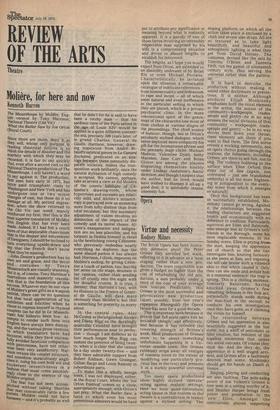Theatre
Moliere, for here and now
Kenneth Hurren
The Misanthrope by Moliere, English version by Tony Harrison; National Theatre (Old Vic) What the Butler Saw by Joe Orton (Royal Court) Since there are those, deny it as they will, whose only purpose in reading theatrical notices is to relish the details of disaster and the acerbity with which they may be recorded, it is fair to say quickly that, even after a second visit to the National Theatre production of The Misanthrope, I still haven't a word to say against it. The production, first seen here early in 1973, has since paid triumphant visits to Washington and New York and has undergone one or two minor Changes of cast, but these do it no damage at all. My second impres sion, when the show returned to the Old Vic last week, merely reinforced my first: that this is the Most superior translation of Moliere into English that has ever been made. Indeed, if I had but a touch More of that deplorable chauvinism that is the despair and amusement Of foreigners, I should be inclined to
turn everything. upside-down and say that the French don't know What they're missing. John Dexter's production has its OW n wit and grace, and the decor and costumes by Tanya Moiseiwitsch are visually stunning, but it is, of course, Tony Harrison's marvellous and masterly translation that is the foundation of this success. Whatever may be our view of M. °Here's great gifts as a waspish satirist, there can be no question but that local appreciation of his subtleties and felicities when he Chose to express himself in rhymed couplets (as he did in Le Misanthrope) has hitherto been low. Attempts to render such lines into English have always been dismaying, and the various prose versions, to which translators have had recourse, while they have successfully avoided facetious comparison With pantomime, have not otherwise been very satisfactory. Harrison retains the couplet structure, and somehow miraculously anglicises it, using his own bold wit and exuberant inventiveness in a fashion that must come astonishingly close to the essence of the Moliere original.
The feat has not been accomplished without taking liberties that may conceivably rattle a few Purists. Moliere could not have foreseen — and it's probably as well that he didn't for he is said to have been a tetchy man — that his sardonic view of the Paris salons in the age of Louis XIV would be applied in a quite different context: the era, precisely 300 years later, of le grand Charles, General de Gaulle. Harrison, however, drawing inspiration from Andre Ribaud's satirical pieces in Le Canard Enchaine, predicated on an analogy between these ostensibly disparate societies, makes the transposition work brilliantly, once the natural stylisation of high comedy is accepted. We cannot, perhaps, take as severe a view as did Moliere of the coterie habitués of Celimene's drawing-room, whose hypocrisies and excesses are relatively mild, and Alceste's misanthropy is portrayed now as stemming more from lofty disdain than from total revulsion; but this necessary adjustment of values involves no diminution of the impact of the comedy and its moral theme. Alceste's exasperation and indigna tion are no less plausible, and his torment in finding himself in thrall to the bewitching young Celimene, who perversely embodies nearly everything he deplores, has the same absurd pathos it has always had. Harrison, I think, improves on Moliere's ending, by giving Celimene a touch of pathos, too, leaving her alone on the stage, desolate in her vanities, rather than sending her off cruelly into the night with her dreadful cronies. It is true, I daresay, that Harrison's text, with its illusions to the France of General de Gaulle, will date more obviously than MoHere's; but that is something for posterity to worry about.
In the central roles, Alec McCowen as the anguished Alceste and Diana Rigg as the dazzlingly delectable Celimene have brought their performances near to perfection — though I am dubious as to how much longer Miss Rigg can sustain the pretence of being twenty, when it is clear that she cannot be a day under twenty-five — and they have admirable support from Robert Eddison, Gawn Grainger, Gillian Barge and Louie Ramsey in subordinate parts.
To make this a wholly benign week, I was not displeased, either, at the Royal Court, where the 'Joe Orton Festival' comes to a close, appropriately enough, with Orton's last play, What the Butler Saw, a farce to which even his most pretentious admirers would be hard put to attribute any significance or meaning beyond what is instantly apparent. It is a parody of one of those farces involving an ostensibly respectable man surprised by his wife in a compromising situation and driven to absurd lengths to establish his innocence.
The lengths, as I hope you would
expect from Orton, are extended to
an absurdity undreamt of by Brian Rix or even Michael Pertwee.
Characteristically, he lavished upon the situation a remarkable catalogue of indelicate references — from homosexuality and lesbianism to rape and incest — all of which seem natural and even inoffensive in the particular setting in which they are placed, which is a private psychiatric clinic. In the more conventional spirit of the genre, most of the characters lose most of their clothes at various stages of the proceedings. The chief source of humour, though, lies in Orton's peculiarly stylised dialogue, which never deployed more compactly his gift for the incongruous phrase and the precisely inapt cliche. Michael Medwin, Valentine Dyall, Betty Marsden, Jane Carr and Brian Glover are among the players disporting themselves nimbly under Lindsay Anderson's hectic direction, and though I suspect that the author, had he lived, would have wished to sharpen it all up a good deal, it is splendidly insane, unseemly fun.


































 Previous page
Previous page